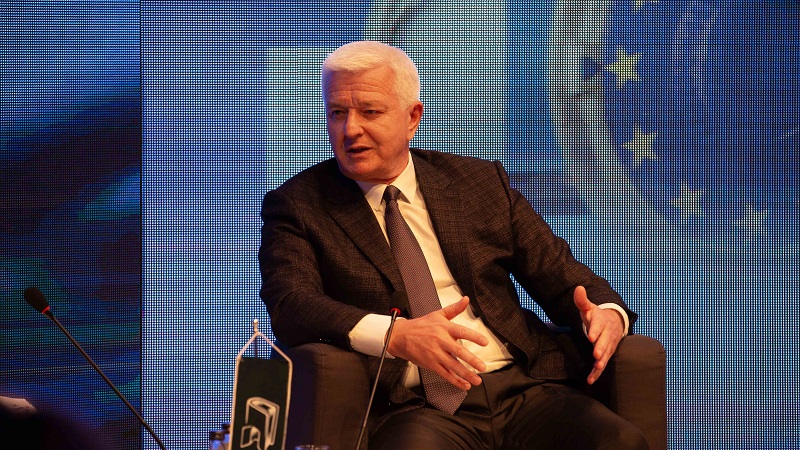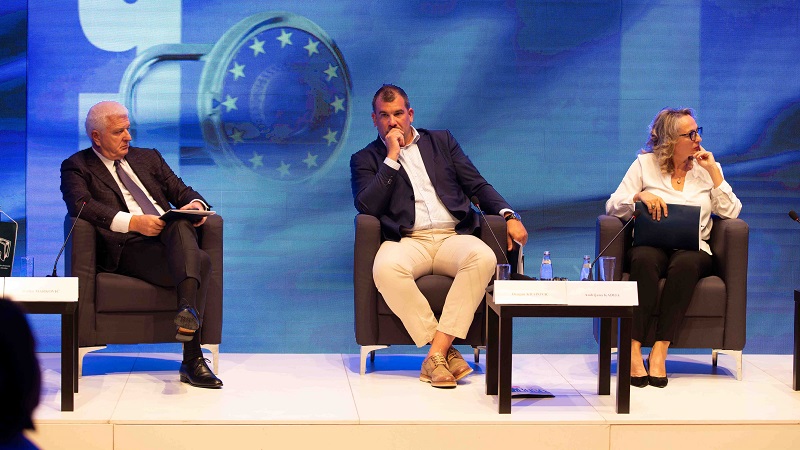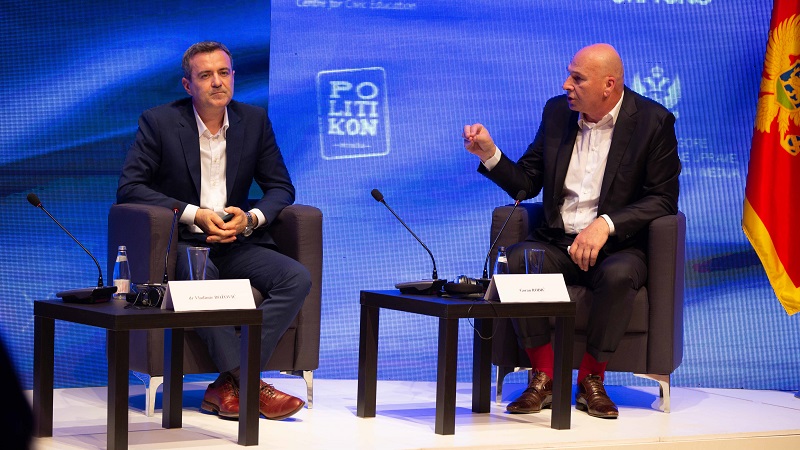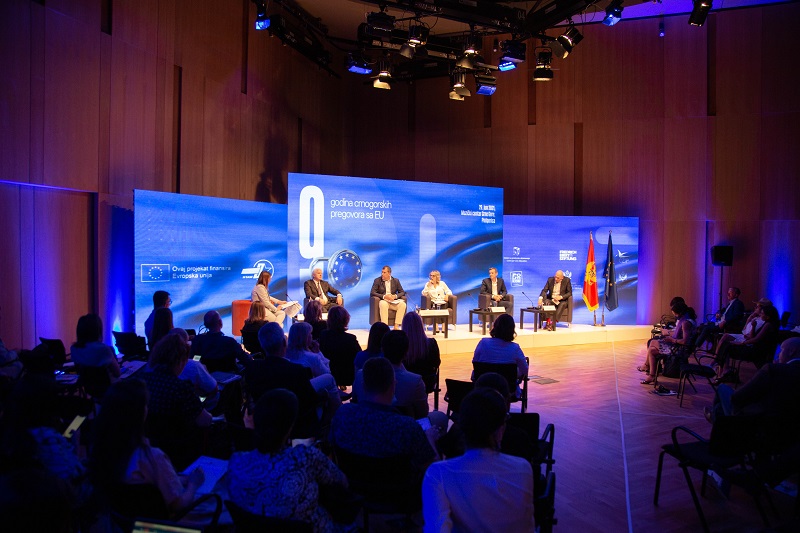Political structures must provide consensus to accelerate Montenegro’s accession to the European Union (EU), but that dialogue should not be held between the government and the opposition, because it would be a race for power, but within a different social platform. This was stated at the panel “The first nine years – where is Montenegro on its way to the EU?”, which was organized by the Centre for Civic Education (CCE) within the conference “Nine years of Montenegrin negotiations with EU”.
Member of the Parliament of Montenegro (DPS) and former Prime Minister of the Government of Montenegro, Duško Marković, considers that whenever Montenegro becomes an EU member state, “it will happen thanks to some social consensus”.
“This process cannot be completed and successful for Montenegro if the majority of political and social actors of the entire social superstructure do not dedicate themselves to the most important state interest and priorities”, emphasizes Marković.
He assessed that his Alliance for Europe initiative was fully justified and necessary even nowadays.
Marković admits that the previous Government could have done more when it comes to the European integration but also that a lot has been done in that process since 2012.
“Today, no one in Montenegro is asking whether we will be the EU member state, but when we will become one”, he said.
“Stating that we will be an EU member state in 2024 reflects not knowing that process, not participating in that process and unawareness of the complexity of that process. Personally, I would like it to happen in 2024, I would make a toast with champagne on Podgorica’s square, but I do not think that is a realistic prognosis”, stated Marković, referring to the statement of Prime Minister Krivokapić that Montenegro could join EU in 2024.
He considers that dialogue is necessary, stating that without that approach, Montenegro will not make progress.
“I do not think that the dialogue should be held between the government and the opposition, because it would be a race for power. Dialogue in Montenegro should come from the different social platforms. As political leaders, we must find ways to agree and provide consensus on what our vital, internal values are”, concluded Marković.
Member of the European Integration Committee in the Parliament of Montenegro, Dragan Krapović (Democratic Montenegro), considers that the lack of political will is a constant in the negotiation process of Montenegro, as well as “our inability as a society, but also those who were the elites in power, and to some extent the current government, as well, to agree on the basic values around which we are all declaratively gathered.”
He deems that Montenegro is a small system and that it is realistic to become an EU member state in 2024 if there is political will, as well as favourable circumstances.
Krapović underlined that the political party he represents is willing to engage in dialogue aimed at reaching a solution and European integration.
Journalist and former Director-General of RTCG, Andrijana Kadija, thinks that most media do not work professionally, nor in the public interest.
“I am sorry that I have to say that the Public Broadcasting Service has not been working in the public interest for years. More precisely, it works in that interest when it corresponds to the interest of the former ruling party. I am afraid that this trend will continue and that the current government will be tempted to control the work of the Public Broadcasting Service in the same manner”, pointed out Kadija.
According to her, the media community is trapped by a new trend in journalism.
“There is the so-called delivery journalism. We have turned into an instantaneous water heater, hearsay, people who have their interests. Most often, politicians provide certain information daily and we quote them zealously, as if they were all Nobel laureates. Thus, we do not perform a key function – informing, analyzing, investigating their statements, but we publish them unprocessed, additionally contaminating the public”, Kadija pointed out.
She also emphasized that the Public Broadcasting Service no longer broadcasts any shows which focus on European integration.
Furthermore, she believes that the citizens and authorities will benefit the most from the professional public service, and that the authorities must provide an environment for such a public service because through this example it will prove to European partners that it enables media freedoms.
Acting Rector of the University of Montenegro (UoM) dr Vladimir Božović, said that at the beginning of the multi-party system, the academic community had been significantly more involved in social events than in previous years, stating that there were two possible reasons for that.
“The first one is the fact that harsh critics have been silenced in various ways over time, both by narrowing the media space and by a certain type of status degradation. Thus, they concurrently were a lesson to the statistically dominant part of the politically cautious university community”, said Božović.
Božović assesses that not all available capacities are used in Montenegro.
“Montenegro is small and we have limited capacities. That is also the situation within the academic community. However, in that sphere, as well as in others, we must overcome ideological and political boundaries that intersect Montenegrin society. Historically, regardless of which ideology and policy are dominant, I would say that Montenegro is constantly functioning with 50% capacity. Therefore, even small with limited capacities, we constantly reject one-half of Montenegro, which is essential for progress. Even in this half, which is ideologically acceptable, we often have negative selection because of, for example, progressive thinking within that community”, he explained.
Božović considers that the University was not sufficiently involved, “not only in the EU accession process, but also in some other processes of great significance.”
“I believe that this can change, but it depends on freedom. The more freedom is given to people from the academic community and the more they feel the purpose of their public action, the more involved the University will be”, said Božović.
Lawyer Goran Rodić states that when it comes to the judicial system, i.e. the judiciary and the prosecution, minor or no changes have been noticed in the improvement of the spatial and working conditions of the judicial bodies over the past 30 years.
“The state but also the silence of the judiciary will tell you enough. If there is the first among equals, such as the former president of the Supreme Court, who has been granted housing assistance by the executive three times in a non-transparent manner, it is indicative that this does not really bother any judge in Montenegro”, said Rodić.
He assessed that hardly anyone will succeed when it comes to the election of key judicial officeholders if the authority and the opposition do not have interest and do not find a compromise for the best candidate who could perform the function.
Commenting on the prosecutorial laws, Rodić deems that the legislative framework is not a problem.
“The problem is that nobody calls into question the fact that none is applying for the position of Supreme State Prosecutor, knowing that there are over a hundred prosecutors in the Montenegrin Prosecutor’s Office, over 200 judges in the judiciary, 900 to 1000 lawyers outside the structures of the Prosecutor’s Office and the judiciary. Or, the fact that no one is applying for the position of President of the Supreme Court”, claimed Rodić.
The conference is held within the project “CSOs in Montenegro – from basic services to policy making – M’BASE ” implemented by the CCE, in partnership with German Foundation Friedrich Ebert (FES), NGO Center for Protection and Study of Birds (CZIP) and NGO Politikon, in cooperation with the Ministry of Public Administration, Digital Society and Media and the Office for European Integration of the Government of Montenegro. The project is funded by the European Union.
PR press service





